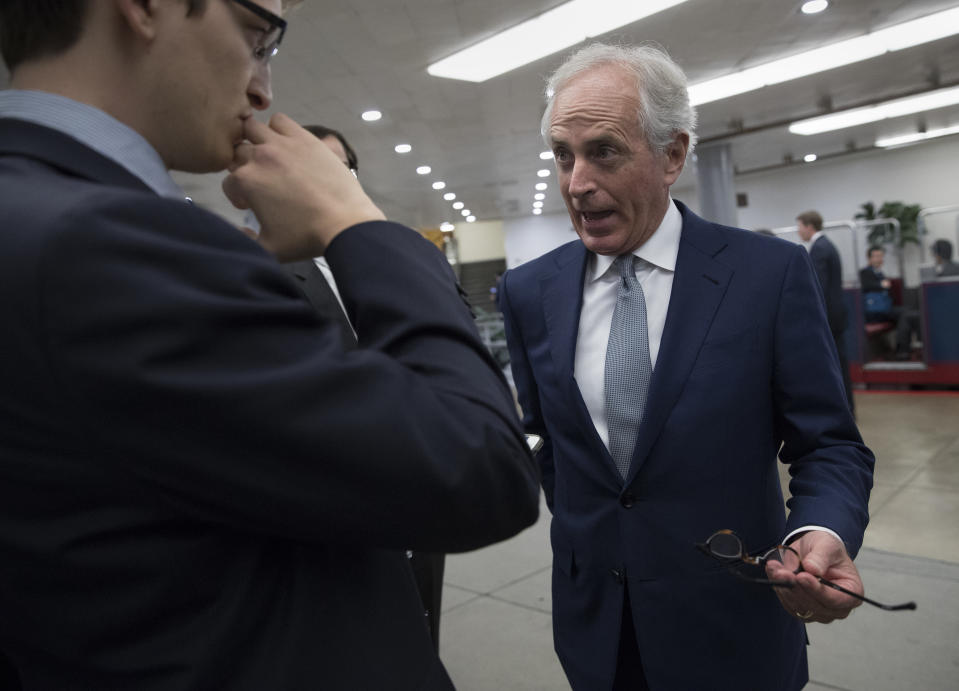Factbox: Republicans to watch in U.S. Senate tax bill fight
WASHINGTON - Some key U.S. senators still had concerns about the Republican tax bill in the Senate, as a procedural motion to formally open debate on the measure was approved on Wednesday. Here is a list of Republicans pivotal to the bill's fate. SUSAN COLLINS The moderate senator from Maine has qualms about Republicans’ plan to include in the tax bill a repeal of a federal fee imposed on people who do not comply with Obamacare's "individual mandate." The fee is meant to encourage young, healthy people to get health insurance so that premiums are affordable for old, sick people. Collins and others fear repealing the fine would drive up insurance premium costs, canceling out tax-cut gains that many of their constituents might get from the tax bill. Collins said Republican leaders had promised her to take up two healthcare provisions before the end of the year to help mitigate the impact of repealing the fee. Those provisions would help insurers cover expensive patients and continue Obamacare subsidy payments for low-income people for two years. Collins has also prepared an amendment to the tax bill to make state and local property tax deductible up to $10,000, a provision that is part of the House of Representatives' tax bill. Both the Senate and House bills end deductibility of state and local tax income and sales tax. Unlike the House bill, the Senate bill ends property tax deductibility too. Collins sidestepped a question on whether she would vote for the tax bill. She said: "We're doing this one step at a time." LISA MURKOWSKI The senator from Alaska will vote for the tax bill, she wrote on Twitter on Wednesday evening. Murkowski said a number of the bill's features were "very attractive," noting that it would lower tax rates, double the child tax credit and double the standard deduction. She said it also included a provision she had written, to open the Arctic National Wildlife Refuge, or ANWR, to oil and gas drilling. Murkowski said it was important to enact reforms separately to help stabilize the individual market in health insurance. STEVE DAINES The Montana Republican has concerns about the bill's treatment of "Main Street" businesses. He said on Wednesday he had secured an agreement to increase a 17.4 percent deduction for owners of pass-through businesses to 20 percent. RON JOHNSON The senator from Wisconsin also has demanded more favorable treatment for "pass-through" businesses, which include sole proprietorships and partnerships, as a condition of his support. BOB CORKER Corker, a deficit hawk from Tennessee, said on Tuesday he had the outlines of a deal adding a tax snap-back provision to the bill that would raise taxes automatically if economic growth targets are not hit in the future to offset a higher deficit. Corker said that arrangement would satisfy his concerns that the tax cuts could add too much to the national debt. As of Wednesday evening, the details had not been announced. The snap-back proposal also became a target of growing criticism among conservative Republicans and lobbyists. The tax bill was expected to add $1.4 trillion to the $20 trillion national debt over 10 years. JEFF FLAKE The Arizona conservative said on Wednesday he was more comfortable with the tax bill because of indications there would be provisions in it to protect against ballooning the deficit. Flake told National Public Radio he was concerned about "gimmicks," but liked other parts of the bill, especially the corporate tax cut. JOHN MCCAIN The Arizona maverick and former presidential nominee sidestepped questions on Monday about how he would vote on the tax bill, telling reporters in the hallway to "stay tuned." JAMES LANKFORD Like Corker and Flake, Oklahoma's Lankford questions whether tax revenues from economic growth will compensate for the expected increase in the national debt under the tax plan. He has been working with them to "trigger" more revenues if needed. JERRY MORAN The Kansas lawmaker is also wary of the impact on the national debt, pointing to his own state's recent experience of fiscal problems following tax cuts. (Reporting by Susan Cornwell; Editing by Kevin Drawbaugh and Peter Cooney; susan.cornwell@thomsonreuters.com )


